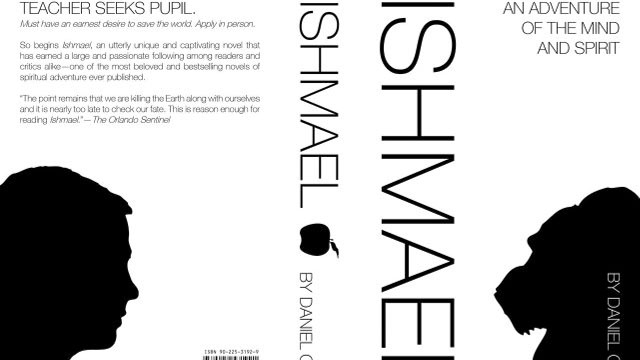Ishmael, both as a book and also as a character, forces you to question your sensibility. It forces you to question all that you have been taught and learnt through the years. It takes your ideas of consumerism, industrialisation and the ‘˜path of development’ theory and throws it out of the window
Let me accept, I am not an enthusiastic reader. But I’m so glad that I took up the opportunity to read something like this. Ishmael, both as a book and also as a character, forces you to question your sensibility. It forces you to question all that you have been taught and learnt through the years. It takes your ideas of consumerism, industrialisation and the ‘path of development’ theory and throws it out of the window.
Ishmael is a gorilla who was captured from his jungles as a young one and has spent the rest of his life among humans. During his years of captivity, he develops intelligence or rather an understanding that makes him better aware of his surroundings, humans to be more precise. He is eventually taken by Walter Sokolow, with whom he learns to communicate telepathically. Ishmael then starts reading, and what starts just as an understanding of ‘captivity’, later expands to encompass a broad investigation of humanity and the world we live in. He goes on to get part of the large estate after Sokolow’s death and lives in the city almost independently. He also becomes a teacher whose wants to save the world. It is for this that he tries to find students to spread his teachings. In all his intellectual arrogance and headstrongness, he challenges his pupils to find hope for humans regardless of the obstacles.
The beginning of ‘Ishmael’ involves the narrator going through the classifieds in a newspaper. An advertisement about a teacher is looking for a student willing to save the world grabs his attention and also leaves him annoyed. His annoyance stems from the fact that, his entire life he was looking for someone like that and its only now that someone has come looking for him. Without really trusting the advertisement, he heads to the mentioned address, only to find this monstrous ape, which is able to communicate with him telepathically. This is the ‘guru-shishya’ duo, Ishmael the gorilla and the narrator.
Ishmael really is the carrier, the carrier of Quinn’s theories about humans and their prejudices towards other life-forms and their existence. Ishmael tries to teach humans what he has learnt of them through his years in captivity. He tries to bring them face-to-face with the fact that they themselves, in pursuit of advancement and domination, have become slaves to the self-destructive path of life.
Ishmael talks of two human groups, namely Takers and Leavers. Takers are the ones who are dominant in nature and in constant pursuit of ways to improve themselves intellectually and technologically and end up as the supreme species on the planet. While Leavers on the other hand, are members of tribal cultures and communities who live a very simplistic life and follow the same basic principles that govern other life-forms on Earth. Ishmael talks about how the Taker community outwitting the basic natural and ecological principles is just a façade, and that they are actually dooming themselves as they strip away Earth of its resources.
This is where the book begins to question every little fragment our support system is built on. The technological advancements, consumerist outlook and industrialization have tuned our cultural attitude in a way that every tiny society, even though self-sustaining, seems uncivilized and prehistoric to us. We moved from hunting and gathering to agriculture. Now, our pursuit on getting land and mechanising agriculture has led to the deterioration of crops and the land itself. We have invented automobiles, airplanes, rockets and so many other machines for our convenience, safety and defense but we forget the extent to which their fuel drains the planet’s natural resources. Our medical facilities seem top-notch, but the kind of metallurgical and medical waste created is unaccountable. Almost each and every single invention of ours is gradually depleting the ozone and causing global warming, while we struggle to control it.
As nations we are failing. Our quest for power and want of more resources both natural and man-made is causing emotional disintegration on a global level. In pursuit of being the perfect nation, every nation is missing the mark wildly. Ishmael at no point of time tells us to get back to how are ancestors lived, neither does he tell us to abandon science and technological advancements. All he wants us to do is to abandon ignorance. He simply pulls off the veil that civilization has put over the human community.
The book ends with the narrator, in the absence of Ishmael, trying to continue what Ishmael had started and spread his teachings to enlighten as many individuals as possible.
Science, technology, finance, industries are all important, but they are not the answer to help the human race survive and sustain. The answer lies in man himself. Each one of us in our own capacities needs to change to see an effect on a macro level. This book can leave you with a million thoughts in your head, of which all can’t be jotted down. Many a times, like comatose patients, we just lead lives thinking nothing can be changed. This is where the question arises, are we as individuals ready to realise that there is still hope and that with persistent effort things do change?





